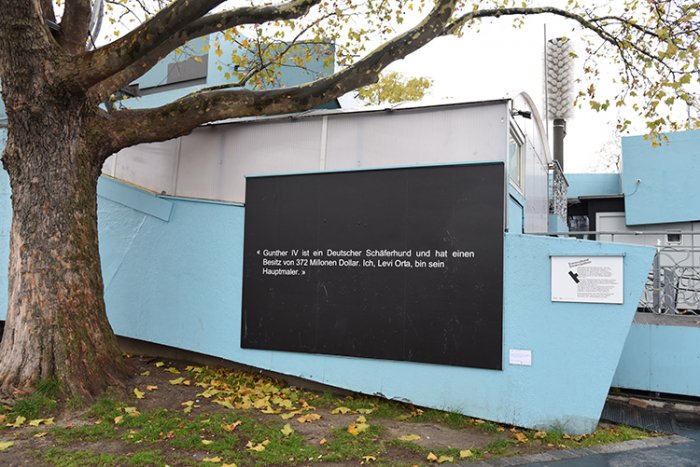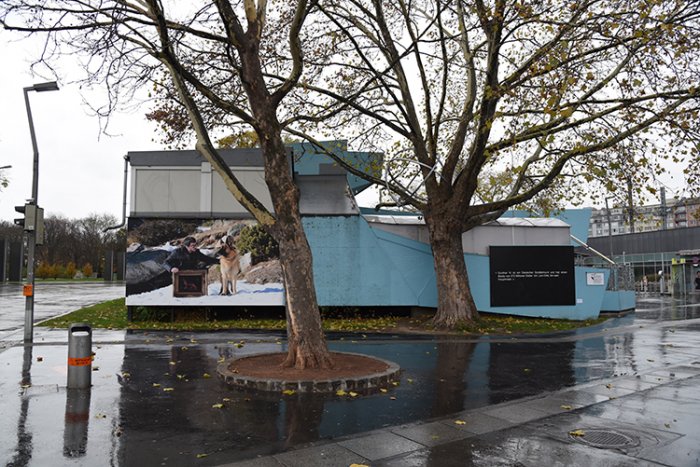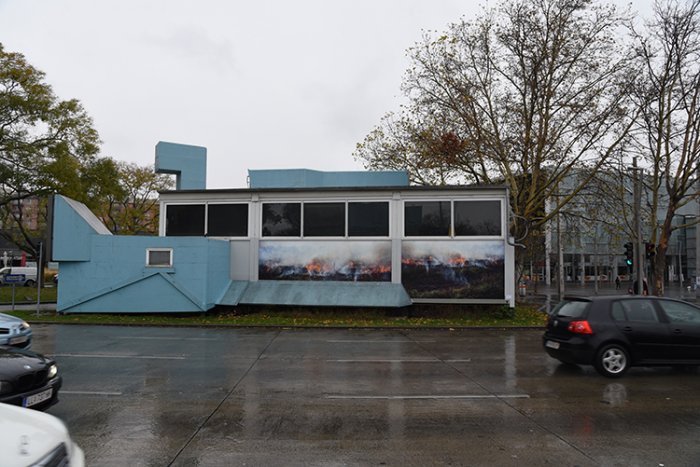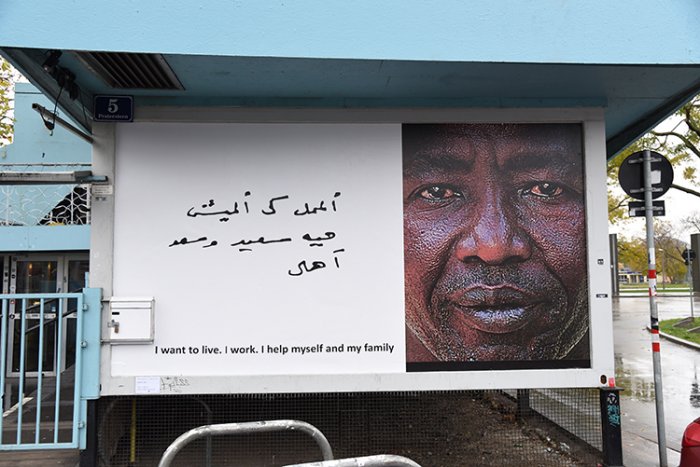Kunst im Fluc
Trancultural Emancipation
15. November 2017
mit Mila Pani, Levi Orta, Alexandru Raevschi Billboardprojekt in Kooperation mit BKA und Kulturkontakt Austria kuratiert von Ursula Maria Probst
Transcultural Emancipation
Im Rahmen einer Kooperation mit dem Bundeskanzleramt und KulturKontakt Austria bespielt das Fluc die an den Außenwänden der Fluc-Architektur installierten Billboardwände. Einer politischen Praxis von Kunst im Stadtraum folgend, wird damit im Austausch und in Zusammenarbeit mit internationalen KünstlerInnen, die sich als Artists in Residence für drei Monate in Wien aufhalten, eine Präsentations- und Interventionsfläche im urbanen, öffentlichen Raum geboten. Das Projekt "Transcultural Emancipation" ist Teil dieser 2013 gestarteten und fortlaufenden Initiative.Worin bestehen heute emanzipatorische Prozesse, Aktionen zur Befreiung von gesellschaftlichen Normen und medienpolitisch forcierten, einschlägigen Weltanschauungen? Wie können in der Diskussion darüber neue Territorien besetzt werden, um in diesem Zusammenhang stehende transkulturelle Positionen zu thematisieren? Welche Fähigkeiten, sozialen Beziehungen, individuelle Lebensperspektiven spielen hier in der Ausbildung einer differenzierten Sichtweise hinein? Welche Möglichkeiten bietet das Verflechtungsmodell der Transkulturalität gegenüber jenem der Interkulturalität in der Auseinandersetzung mit kulturellen Differenzen und wie wird künstlerisch damit umgegangen?
Die Auseinandersetzung mit Mechanismen und Strukturen transkultureller Emanzipation im künstlerischen Feld gestaltet sich je nach Kontext und kultureller Rezeptionsästhetik unter verschiedenen Vorzeichen und ist folglich einem ständigen Prozess der Veränderung unterworfen. Bei den im Rahmen von "Transcultural Emancipation" realisierten Projekten ist die Auseinandersetzung mit der transkulturellen Situation am Wiener Praterstern ebenso immanenter Bestandteil wie die Hinterfragung dessen, wie künstlerische Arbeit in eine politisch gesellschaftliche Dimension überführt werden kann. Die Billboards bilden nicht bloß eine Schau- und Projektionsfläche, sondern sollen zur Kommunikation anregen, uns interessiert die Reaktion der PassantInnen, die Hinterfragung jener Konstellationen, einer in Veränderung begriffenen gesellschaftspolitischen Situation.
Levi Orta, Fuck the proletariat, I want to be the official painter of the Gunther Family, 2017, Billboards
Gunther IV, a German Shepherd, is the world's richest dog. The German
Countess Karlotta Liebenstain left an inheritance $ 124 million to his
faithful furry friend Gunther III, after she died in 1992. After the
death of Gunther III, his son, Gunther IV, inherited the fortune of his
father, who has grown to $ 372 million. In July of 2000, the agents who
act on behalf of Gunther IV bought the former residence of Madonna in
Florida, causing a big media attention.
Behind this charismatic German Shepherd we can find tax evasion
practices, new power and domination relations and a quite original
instrumentalization of the symbols of social status. But, what are the
cracks in the law that allow that a dog can inherit a million dollar
fortune and become the majority shareholder of a transnational
corporation? Gunther Corporation. How the Marxist theory of class
struggles become in front of the Gunther history?
In a first phase of this project, I initiated the contacts needed to be
the official painter of Gunther Family. To do this, I followed the
protocols set out to contact Gunther, even when everything pointed to
Gunther IV was dead. Ironically, he continues answering his
correspondence. As a gesture of approach I sent a portrait to him as a
gift, showing its elegance and grandeur as the richest pet in the world.
Now, after contact the Gunther family and already having the title of
official painter of the Gunther family, as a second phase of the project
I will investigate the descendants of Gunther IV.
Levi Orta´s works explores the creative component of politics, focusing
on the inaccuracies of the art- political boundary. He reproduces
mechanisms, strategies and behavior of political-artistic situations
that have been filed, thus highlighting its most subversive undertone;
always from a cynical stance that threatens the hegemonic.
Levi Orta, *1984 (Cuba). He lives and works between Havana and Barcelona. Graduated from the Instituto Superior de Arte of Havana (2010), from Cathedra Arte de Conducta (2009) and the Home Work Program of Ashkal Alwan of Beirut (2016). In recent years, Orta has participated in exhibitions in several countries like Germany, Austria, EEUU, Spain, France, Israel, Brazil, Mexico, Canada, Croatia, United Kingdom, China, Japan, Lebanon and Cuba.
www.ortalevi.blogspot.com
Mila Panic, Burning Field, 2017, Photo/Billboard
The work presents the landscape I grew up with and the field which one
day it is supposed to be mine, as a family inheritance. The fire is for
burning crops and weeds after the autumn harvest, to clear and fertilise
the land for next year, or at least we believe so. What is my
responsibility towards my heritage? To the whole timeline and the
stories that are incorporated within this landscape? One of our deepest
needs is for a sense of identity and belonging. A common denominator in
this is human attachment to landscape and how we find identity in
landscape and place. Through living in it, the landscape becomes part of
us, just as we are part of it.
Mila Panic *1991 (Bosnia and Herzegovina). Co-founder of project for
popularisation of contemporary art in Bosnia and Herzegovina 'APARTMAN'.
Graduated from MFA - Public Art and New Artistic Strategies at
Bauhaus-Universität, Weimar (Germany). Participated in number of solo
and group exhibitions, festivals, projects and screenings.
www.milapanic.weebly.com
Alexandru Raevschi, Open day, 2012/2017, Photo/Billboard
In 2012 when I lived in Linz during the development of my artistic
research concerning territorial peculiarities, I discovered for myself a
rather interesting segment for observation and analysis. This concerned
the division according to the nationality of the public space of the
city into separate zones. I decided to take interviews from the
inhabitants of Linz. From the beginning, I took portraits of people who
gave me an interview and then I asked them to write on the sheet of
paper just one word or very short sentence, which for them was the most
clearly reveals their opinions regarding the migrant workers.
Later, through photo collage, I combined the inscriptions with their
authors. Thus, I tried not only to disclose the visible content of the
inhabitants of the city of Linz, but also their state of mind with
respect to visiting people from other countries who are trying to be
integrated into a new reality in which they were often not thanks to
their own will. The project was implemented in the form of an
interactive, social - photo project in the public space of the city of
Linz (Austria).

Levi Orta, Fuck the proletariat, I want to be the official painter of the Gunther Family, 2017, Billboards

Levi Orta, Fuck the proletariat, I want to be the official painter of the Gunther Family, 2017, Billboards


